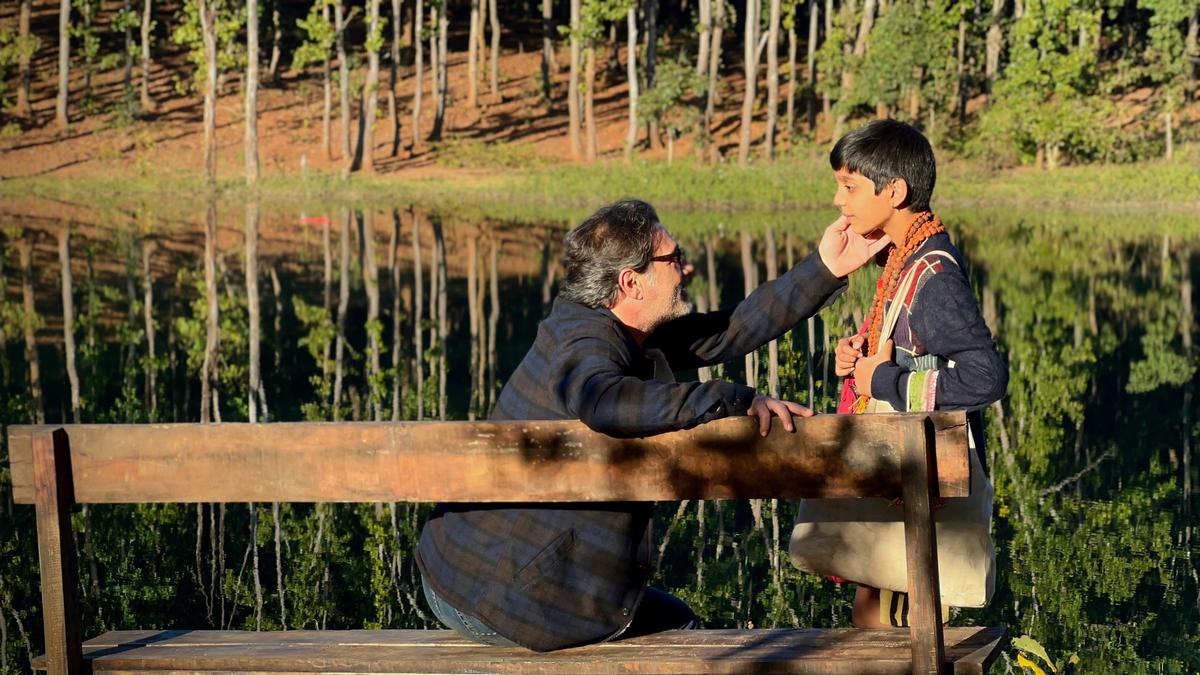A view of ‘Parikrama’
The politics of destiny and development come together in Gautam Ghosh’s latest artwork, which depicts the impact of mega projects in the Narmada Basin on human life and the environment.
Initially, the Indo-Italian production seems like a venture to sell the serene Narmada Valley to Italians who historically love to travel and explore the cultural diversity of India. Yet, as the narrative takes shape, Ghosh, one of the pioneers of the parallel cinema movement in India, demonstrates how the gentle touch of the ethereal can be a subversive tool, evoking memories of the New Wave days. Does not shy away from speaking truth to power when projects were co-financed by the state.
Set like a picturesque canvas that holds within its layers the contradictions of tradition and technology, growth and development, Parikrama follows Alessandro or Alex (Marco Leonardi), a conscientious Italian filmmaker who makes films on environmental displacement. . He is keen to make a documentary on pilgrims circumambulating the Narmada, but the river is fast losing its character due to the many dams built across its vast course.
A single father, Alex leaves his son Francesco (Emmanuel Esposito) with his grandmother in the Mediterranean country to trace the journey of the mighty Narmada in the Arabian Sea. The film, shot by Ghosh and his son Ishan Ghosh, shows how water can be both a life-giving and destructive force and focuses on how nature is central to Indian civilization. The form is pure and the expression ranges from poignant to pointed, as the gaze veers between sympathetic and incisive.
In India, Alex is joined by Roopa (Chitrangada Singh), a social worker in child welfare battling her own demons. Eager to find a voice for the film, Alex meets Lala (Aryan Badkul), a street-smart teenager who sells curios on the riverbank. As a lasting bond develops between the two, an excited Lala narrates the tragic story of how his village drowned in the river due to a dam project. Only one unruly man from the village dares to speak against the project and a child is left to tell the story.
Criticizing the Western perspective on India, the film comes across as a poetic follow-up to Roberto Rossellini’s ethnographic docu-fiction Motherland (1959). In the Italian master’s picturesque depiction of Nehruvian India, the narrator Devi finds livelihood and protection from floods in the erstwhile Hirakud Dam. Six decades later, Lala lost his land, livelihood and possibly hope to another huge concrete structure in the middle of the river. And if you look carefully, Nehru’s photo, stained with years of dust, is displayed in a government office, where the official refuses to give compensation without documents. Yesterday’s solution may be today’s problem.

For Marco, who burst onto the scene as a teen star with Cinema Paradiso (1988), Parikrama is a cinematic detour of sorts because three decades after playing the teenage Toto in the Italian classic, he gets the chance to be Alfredo to the beloved Lala. Get it. Like Rabindranath Tagore’s Kabuliwala, Alex, a foreign traveller, sees a shadow of his son in Lala. There is an interesting phrase for this in the film, Hamara Naseeb, which explains how marginalized people surrender to their destiny and how our lives seem interconnected. This juxtaposition of destiny comes through in the background score as Ghosh uses operatic music to create emotional excitement in scenes depicting environmental displacement around the Narmada. When Alex becomes enraged by the giant structures rising out of the river, he mentions Atlantis, the imaginary island in Plato’s work that was lost to the world due to human arrogance; Like fun in water parks built on stagnant water, where consumers may not realize who has paid with their lives for their entertainment.
The film took a long time to complete and perhaps that is why the impact of some scenes in the second half could not be fully felt. The conversation between Alex and Rupa continues to drag on. Aryan has unmistakable charm and talent for performing, but at times his enthusiasm gives the impression that he is in a summer workshop. However, Ghosh did not give up his search and even placed himself under investigation. Rupa questions Alex’s ethics in milking Lala’s heart-breaking story for her project and wonders if he is stalking her. The same question can be asked of Ghosh also. Parikrama takes a few extra detours to avoid easy answers, but the questions it raises leave one numb.
Parikrama has its Asia premiere at the ongoing Kolkata International Film Festival
published – December 09, 2024 12:30 PM IST
